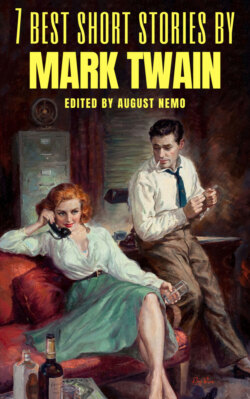7 best short stories by Mark Twain

Реклама. ООО «ЛитРес», ИНН: 7719571260.
Оглавление
August Nemo. 7 best short stories by Mark Twain
Introduction
Mark Twain; The Licensed Jester
About Barbers
A Dog’s Tale. I
II
III
A Ghost Story
A Monument to Adam
Eve’s Diary
Extracts from Adam's Diary
The Stolen White Elephant. I
II
III
Notas
About the Publisher
Отрывок из книги
Samuel Langhorne Clemens (November 30, 1835 – April 21, 1910), known by his pen name Mark Twain, was an American writer, humorist, entrepreneur, publisher, and lecturer. He was lauded as the "greatest humorist the United States has produced," and William Faulkner called him "the father of American literature". His novels include The Adventures of Tom Sawyer (1876) and its sequel, the Adventures of Huckleberry Finn (1884), the latter often called "The Great American Novel".
Twain was raised in Hannibal, Missouri, which later provided the setting for Tom Sawyer and Huckleberry Finn. He served an apprenticeship with a printer and then worked as a typesetter, contributing articles to the newspaper of his older brother Orion Clemens. He later became a riverboat pilot on the Mississippi River before heading west to join Orion in Nevada. He referred humorously to his lack of success at mining, turning to journalism for the Virginia City Territorial Enterprise. His humorous story, "The Celebrated Jumping Frog of Calaveras County", was published in 1865, based on a story that he heard at Angels Hotel in Angels Camp, California, where he had spent some time as a miner. The short story brought international attention and was even translated into French. His wit and satire, in prose and in speech, earned praise from critics and peers, and he was a friend to presidents, artists, industrialists, and European royalty.
.....
Mark Twain has sometimes been compared with his contemporary, Anatole France. This comparison is not so pointless as it may sound. Both men were the spiritual children of Voltaire, both had an ironical, sceptical view of life, and a native pessimism overlaid by gaiety; both knew that the existing social order is a swindle and its cherished beliefs mostly delusions. Both were bigoted atheists and convinced (in Mark Twain's case this was Darwin's doing) of the unbearable cruelty of the universe. But there the resemblance ends. Not only is the Frenchman enormously more learned, more civilized, more alive aesthetically, but he is also more courageous. He does attack the things he disbelieves in; he does not, like Mark swain, always take refuge behind the amiable mask of the 'public figure' and the licensed jester. He is ready to risk the anger of the Church and to take the unpopular side in a controversy—in the Dreyfus case, for example. Mark Twain, except perhaps in one short essay 'What is Man?', never attacks established beliefs in a way that is likely to get him into trouble. Nor could he ever wean himself from the notion, which is perhaps especially an American notion, that success and virtue are the same thing.
In the money-grubbing period that followed the Civil War it was hard for anyone of Mark Twain's temperament to refuse to be a success. The old, simple, stump-whittling, tobacco-chewing democracy which Abraham Lincoln typified was perishing: it was now the age of cheap immigrant labour and the growth of Big Business. Mark Twain mildly satirized his contemporaries in The Gilded Age, but he also gave himself up to the prevailing fever, and made and lost vast sums of money. He even for a period of years deserted writing for business; and he squandered his time on buffooneries, not merely lecture tours and public banquets, but, for instance, the writing of a book like A Connecticut Yankee in King Arthur's Court, which is a deliberate flattery of all that is worst and most vulgar in American life. The man who might have been a kind of rustic Voltaire became the world's leading after-dinner speaker, charming alike for his anecdotes and his power to make businessmen feel themselves public benefactors.
.....